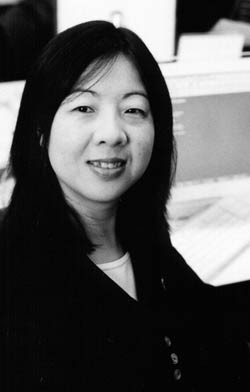Providing ACCESS to China
Everyone knows about China's move to a free-market economy and its resulting emergence as a global economic power. Now the country is changing its education system to match - and Teachers College is becoming an important partner.
In the not too distant past, under China's centrally planned economy, students were considered elements of production, and the nature of their education was determined by where they fit in the production chain. For most, teaching and learning focused on memorization of facts and training students to follow directions. In poor rural areas of China, household education spending was a heavy economic burden, and parents had higher educational expectations for boys than for girls. There was no compulsory basic education.
Today, China is working to shift the emphasis of teaching and learning to one that encourages creative and critical thinking, problem-solving and intellectual independence. A universal compulsory education system is in the planning stages, aimed at creating a more skilled workforce and increasing income for poor and rural families. As a result, the government is not only building new schools, but also investing heavily in teacher professional development, student assistance, distance learning and curriculum reform.
"Many Chinese scholars I talk to believe the success of this reform depends on the quality of professional development for teachers and principals," says Xiaodong Lin, Associate Professor of Education and Technology in the Department of Math, Science and Technology. "Many teacher educators we interviewed in China indicate that until now, teacher training in China has been too theoretical and abstract and does not present ways to address everyday classroom situations. Teachers are not given the opportunity to develop long-term plans, set goals or voice their concerns. Recently, many professional development models from abroad have been introduced, but the contents and the instructional approaches often are not sensitive to the local needs of the community."
Lin is spearheading a pilot project to provide professional development for teachers in China through the Asian-American Center for Creative Educational Sciences (ACCESS), which she recently helped to found. To increase educational equity, the program uses a wide variety of technologies (e.g., paper-based pictures, CDs, audios, videos, internet technologies, etc) and to provide event-based instruction - lessons built around situations that teachers face daily in their own classrooms and that are typical in the local culture. The technology allows even teachers from poor and remote areas to be brought up to speed. "It is a new model and many Chinese educators have found it very easy to adapt to a local culture and local themes. Our goal is to invite teachers to contribute to the instruction by submitting their critical events to the data base that will be used for professional development," Lin says.
In addition to continuing to provide innovative instruction for teacher learning, Lin expects to work with Chinese scholars, principals and teachers to develop what she calls a "hybrid model" that will incorporate the wisdom and challenges from educators in both China and the United States. "I think the kind of training model we could develop together might be extremely important on an international level," she said. Her sentiments are echoed by Zhang Li, Director General of China's National Center for Education Development Research: "Today, China and America share more and more common challenges in education. The more we collaborate and learn from each other's experiences, the better we will all be."
During her recent trip, Lin visited Shanxi province, which will send educational leaders to TC in the spring to help develop training materials with her and adapt them for local use. "We are hoping that by the year 2005, we can have the first run of principal and teacher training around critical event-based models in China," Lin says. "This work requires collaboration among educational scholars from different disciplines at TC because none of us can do it all by ourselves."
Lin traveled to China in October with TC President Arthur Levine and Academic Vice President and Dean Darlyne Bailey. Levine addressed an audience of high-level emissaries from all over China in the Congress Hall in Beijing and presented TC's Medal for Distinguished Service to MadameHao, Director of the Experts' Advisory Committee to the Chinese National Center for Education Development Research and Deputy Director of the Leaders for National Education and Scientific Research and Policy. (For more on Madame Ke-Ming Hao, see the story on page X).
Since returning to the U.S., Lin has been approached for possible China-focused collaborations by Microsoft, the US National Science Foundation, and the World Bank. "The organizations have given lots of resources to to China for different projects in remote areas, and they saw the kind of academic impact and personal connection TC has there," Lin says. "In China it's important to have more than just an official connection-you need to develop mutual and personal respect, and trust. Equal partnership is required for us all to work together."
See Related article "TC Honors China's First Lady of Education"
Published Wednesday, Dec. 22, 2004
